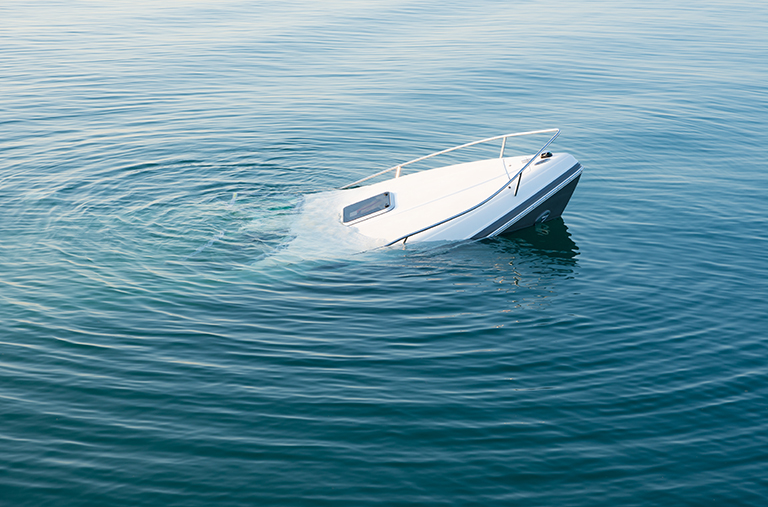A boating accident in Mississippi may happen in many different situations. For some, such as dock workers, professional fishing crews, or crews on cargo, commuter, or cruise ships, it happens at work. Other boat accident injuries happen when people are out for fun, whether sailing, sportfishing, or pleasure cruising. In addition to typical boats, hundreds of thousands of people have personal watercraft, such as SkiDoos and JetSkis, which they usually operate at high speed. Many boating accidents can cause injury or death, and many different laws govern liability in such accidents.

Boating Accidents & Admiralty Law
Many maritime accidents fall under admiralty law. Also called maritime law, admiralty law is actually a complex network of laws that covers all legal contracts, accidents, injuries or crimes that happen on water and waterways used in commerce, both in the U.S. and internationally.
For admiralty law to apply to an offense, the situation must:
- occur in navigable waters, and
- have a significant impact on, or relationship to, traditional maritime activity.
Most accidents involving pleasure craft in navigable waters will not fall under federal admiralty law. But when the accident impacts maritime commerce, or takes place in international waters, admiralty law may provide a plaintiff in a boating accident with advantages that traditional rules of tort negligence may not. A lawyer who can evaluate these strategies, and has experience with admiralty law, workplace injury, and premise liability can help ensure the best result.
Why Boating Accidents Occur
Common causes of Mississippi boat accidents include:
- Operator inattention or improper lookout
- Operator inexperience or navigation rules violation (such as failure to keep required distance from buoys or other vessels)
- Excessive Speed
- Machinery failure
- Alcohol use
- Weather
- Hazardous waters
In fatal boating accidents, the leading cause was alcohol use. Boating Under the Influence (BUI) is a major cause of many recreational boating accidents, injuries, and fatalities. In fact, all states, and the federal government have laws specifically targeting boating under the influence that allows law enforcement officials to stop watercraft to ensure operators are safe to be on the water. If you are found to be BUI, you may be faced with jail time, a criminal record, and expensive fines. Recent surveys showed that 80% of fatal boating accident victims drowned, and of these drowning victims, 83% were not wearing a life jacket.
Common Injuries From Boating Accidents
Injuries and fatalities that result from boating and water-sport accidents include:
-
- Concussion, broken bones or contusions from being struck by a boom on a sailboat
- Cuts and lacerations on fishing boats, either from fishing line or knives used to fillet fish
- Lacerations or amputations from the propeller and/or run-over accidents
- Drowning from overboard accidents
- Carbon monoxide poisoning from improperly vented enclosures, or being too close to boat’s exhaust
- Broken bones or sprains, nerve damage, or brain injury from a slip/trip and fall
- Sprains, cuts or brain injuries to water skiers, wake-boarders, inner-tubers, etc.
Cruise Ship Liabilities
All cruise ships owe their passengers a duty of safe transportation. The Cruise Vessel Security and Safety Act of 2010 makes luxury liners a bit more accountable for what happens to passengers aboard their ship.
The act increases passenger security and cruise ship accountability on cruises through international waters, and includes the following provisions:
- All passengers must have access to a security guide outlining jurisdictional authority on that particular ship, processes for reporting crimes and missing U.S. citizens, and contact information for security, medical personnel, the FBI, U.S. Coast Guard, and local law enforcement in each port.
- Every stateroom must contain a document with the locations of the U.S. embassies or consulates in each port.
- Cruise ships with 250 passengers or more that embark or disembark anywhere in the U.S. must keep a log book recording all crimes and thefts valued over $1000.
- There must be personnel trained in sexual assault response, including anti-retroviral medications, proper collection and preservation of evidence, and knowledge of medical confidentiality provisions. In the event of sexual assault, victims must be given victim advocacy contact information, as well as law enforcement contact information.
- Cruise ships must also have at least one member of the crew trained in crime prevention, detection, evidence preservation and reporting criminal activities in the international maritime environment.
- The act also required safety systems and structural changes to keep passengers safe, and a publicly accessible website tracking cruise ship crime.
Cargo Ship – Port Injury Accidents
Ports are a hive of activity, with large trucks, trains, and ships all converging at the same point. There is an enormous potential for port injury accidents to happen, and even the most cautious dock worker is vulnerable to injury. Injuries falling under this type of boating accident include falling of sliding cargo, falling from heights, fires and explosions, chemical exposure, machinery accidents and equipment malfunctions, and slip and falls.
Injuries from cargo ship and port injury accidents include brain injury, back and spine injuries, broken bones or internal organ damage, loss of limbs, and even wrongful death. While many of these injuries can be preventable, many are also due to negligence.
We Work For You
As a boating accident victim in Mississippi, you have rights. If your accident was caused by another persons negligence, you have a right to recover your medical bills, lost wages and property damage from the accident. Don’t let the insurer pay less than your accident is worth. Chhabra, Gibbs & Gustavis, P.A. is an experienced boating accident law firm, and they know how to deal with insurance companies. Let us represent your interests – call today for a free consultation.

